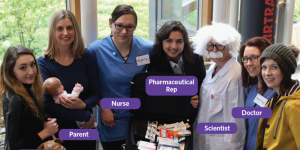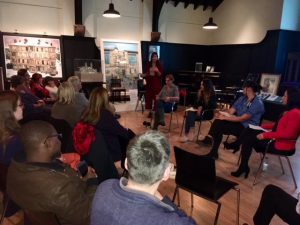This is World Antibiotic Awareness Week and to celebrate the Safeguarding Health through Infection Prevention (SHIP) researchers at GCU thought we’d tell you a little bit about what we’ve been doing to get involved.
World Antibiotic Awareness Week is organised by the World Health Organization and has been running since November 2015. The campaign aims to spread the word about the role we all have in reducing the emergence and spread of antibiotic resistance. Each year, the SHIP group observes the week by taking part in some kind of activity to raise public awareness of the problem and this year this took the form of a debate within the local community.
Queens Cross Housing Association run “Food for Thought” community seminars and GCU’s SHIP team took part in the first of these, entitled, “Whose superbug is it anyway?” Members of the team posed as a farmer, a vet, a doctor, a mum and a pharmaceutical representative to argue about who is responsible for the superbug crisis and to discuss what we can do about it.
The public were invited to come along and listen and join in the discussion, with time for questions and opinions at the end. The SHIP group also took along our interactive hand hygiene machines to demonstrate how to perform hand hygiene effectively as shown from our research. Accurately performed hand hygiene is an important way in which the public could protect themselves from some infections, minimising the need for antibiotics and so contributing to the preservation of antibiotics for years to come.
Our work aims to have an impact on antibiotic resistance through the prevention of infection not only with the public but with healthcare and vetinary professionals too. We have a team of psychologists whose research focusses on the influence of behaviour, specifically looking at public awareness, and the antibiotic prescribing behaviour of vets and nurse prescribers. A grant was received from Health Protection Scotland to work with them in analysing how awareness and behaviours are measured and whether certain interventions are effective at changing behaviour.
More information about our research and community engagement can be found on our website https://www.gcu.ac.uk/ship ,our blog and by following us on Twitter: https://twitter.com/SHIPGCU

